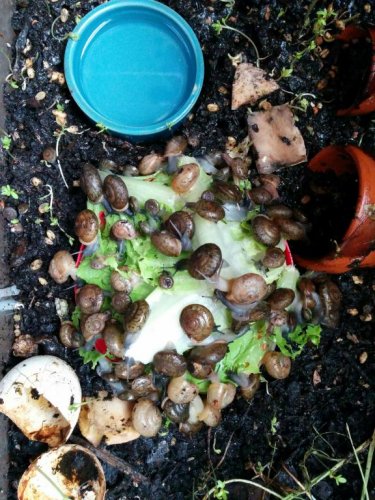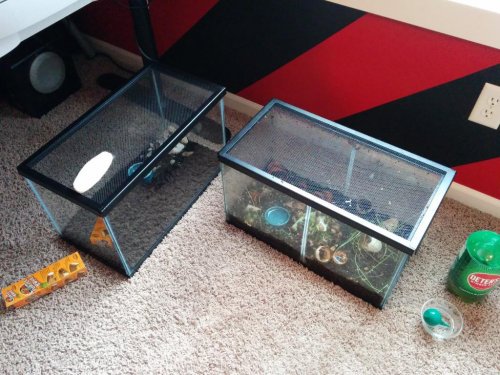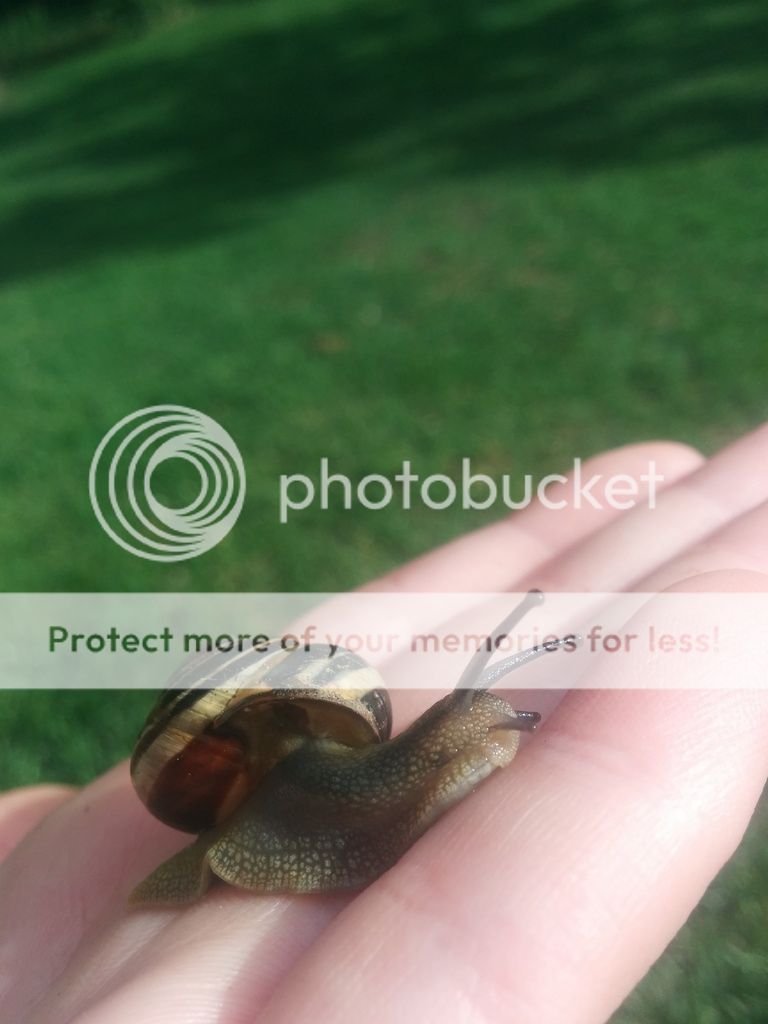Navigation
Install the app
How to install the app on iOS
Follow along with the video below to see how to install our site as a web app on your home screen.
Note: This feature may not be available in some browsers.
More options
You are using an out of date browser. It may not display this or other websites correctly.
You should upgrade or use an alternative browser.
You should upgrade or use an alternative browser.
Common garden snails/slugs
- Thread starter OldChamKeeper
- Start date
Motherlode Chameleon
Chameleon Enthusiast

I found this guy a few weeks ago and have been keeping him in my bioactive frog setup. With this "isolation" would he be okay to be fed to a veiled? He would have only had access to the plants that are cham-safe (ex. ficus), and the dirt/coco husk mixture is all organic, no pesticides etc Is there a way to determine if they have parasites or not?
Normal practice is that you have got to captive breed baby Garden Snails. This allows them not to be exposed to parasites and reduces the risk that your feeder Garden Snails (whatever species) have not got any parasites.
Best Regards
Jeremy A. Rich
Bush baby
Avid Member
How good are these as a staple food?
I recently acquired 3 adults from a guy who breeds them. He also gave me some of the babies. My Jackson's immediately consumed the three babies. He seldomnly responds that enthusuatically to food, other than for superworms.
I've got them in a 10 gallon aquarium. They seem to remain buried in the soil during the day (even though i have them in a dark corner that receives little light and they come out at night to feed.
They seem to like apple and the cuttlebone i have in there. Haven't seen them touch the collard greens yet.
I was also wondering, has anyone tried feeding them repashy bug burger?
I recently acquired 3 adults from a guy who breeds them. He also gave me some of the babies. My Jackson's immediately consumed the three babies. He seldomnly responds that enthusuatically to food, other than for superworms.
I've got them in a 10 gallon aquarium. They seem to remain buried in the soil during the day (even though i have them in a dark corner that receives little light and they come out at night to feed.
They seem to like apple and the cuttlebone i have in there. Haven't seen them touch the collard greens yet.
I was also wondering, has anyone tried feeding them repashy bug burger?
Lathis
Chameleon Enthusiast
We go through a lot of carrots, turnips, and leafy greens. The carrots and turnips are pretty hardy and about as resistant to mildew as anything we have found. The greens don't usually last long enough to get gross. When offered fruit vs veggies, they far seem to prefer the veggies. I haven't found that my snails are much enthused about dry food unless they have no other options. I have tried feeding them Bug Burger without success. We also have cuttlefish bones in the bin as a calcium source and supplement in washed egg shells.
odduc748
Member
This is a very interesting topic.
Do I understand correctly that the snails are to be fed, complete with shell? I would hesitate to feed a large adult snail as I would worry the cham could choke on pieces of shell.
I see many have fed their Jacksons, Parsons and other montane species. Has anyone ever fed snails to Panthers?
I think I've discovered a new project!
Do I understand correctly that the snails are to be fed, complete with shell? I would hesitate to feed a large adult snail as I would worry the cham could choke on pieces of shell.
I see many have fed their Jacksons, Parsons and other montane species. Has anyone ever fed snails to Panthers?
I think I've discovered a new project!
Lathis
Chameleon Enthusiast
This is a very interesting topic.
Do I understand correctly that the snails are to be fed, complete with shell? I would hesitate to feed a large adult snail as I would worry the cham could choke on pieces of shell.
I see many have fed their Jacksons, Parsons and other montane species. Has anyone ever fed snails to Panthers?
I think I've discovered a new project!
I feed them off when they are slightly smaller than a dime - the shells are still adequately soft at that age that they give a bit of crunch, but no real resistance to being eaten.
Bush baby
Avid Member
I also noticed that they breed/ tend to lay eggs in clean soil. I change out the soil completely every 2 weeks, and within days of doing so there is always a fresh batch of eggs.....
The babies seem to be fond of algae wafers, but I have to change them every day, as they get moldy really fast once they get wet...
The babies seem to be fond of algae wafers, but I have to change them every day, as they get moldy really fast once they get wet...
Lathis
Chameleon Enthusiast
Lettuce, a variety of leafy greens, carrots, and sweet potatoes. They go freaking nuts for sweet potatoes. We also offer clean egg shell and cuttlefish bones for calcium. (Edit: Sorry, repeating myself from above!)
This is where we are 6 months after starting with 11 wild caught adults. All these are first generation babies. They should start laying eggs themselves in another few months.
Ditto on the complete clean out every couple of weeks or so. We have two tanks and cycle a full new setup. Toss the soil and scrub what stays. Super easy. They are easy to transfer over with food.


This is where we are 6 months after starting with 11 wild caught adults. All these are first generation babies. They should start laying eggs themselves in another few months.
Ditto on the complete clean out every couple of weeks or so. We have two tanks and cycle a full new setup. Toss the soil and scrub what stays. Super easy. They are easy to transfer over with food.


Lathis
Chameleon Enthusiast
Another note, we have a separate wild adult tank. Every weekend, we would clean out the soil and meticulously separate the eggs. Overkill? Maybe, but I wanted to reduce the potential for parasite transfer as much as possible. We will do this again with generation #2.
If you use organic potting soil, bake it in the oven before using. It comes with all sorts of stuff including wild snail and slug eggs.
We also found that the babies will dig up and eat the eggs, so we use a small hatchery tank before moving the new borns over to the baby tank.
I say "we" because the hubby has taken on much of the snail care. He really likes the little guys and it has been a lot of help!
Edit: Anyone in the KCMO area who wants a starter set of snails or giant canyon isopods, i can hook you up. Both are very easy to raise. The isopods are a great feeder for lots of herps and are on the smaller side of bugs but not too small.
If you use organic potting soil, bake it in the oven before using. It comes with all sorts of stuff including wild snail and slug eggs.
We also found that the babies will dig up and eat the eggs, so we use a small hatchery tank before moving the new borns over to the baby tank.
I say "we" because the hubby has taken on much of the snail care. He really likes the little guys and it has been a lot of help!
Edit: Anyone in the KCMO area who wants a starter set of snails or giant canyon isopods, i can hook you up. Both are very easy to raise. The isopods are a great feeder for lots of herps and are on the smaller side of bugs but not too small.
Bush baby
Avid Member
Another note, we have a separate wild adult tank. Every weekend, we would clean out the soil and meticulously separate the eggs. Overkill? Maybe, but I wanted to reduce the potential for parasite transfer as much as possible. We will do this again with generation #2.
If you use organic potting soil, bake it in the oven before using. It comes with all sorts of stuff including wild snail and slug eggs.
We also found that the babies will dig up and eat the eggs, so we use a small hatchery tank before moving the new borns over to the baby tank.
I say "we" because the hubby has taken on much of the snail care. He really likes the little guys and it has been a lot of help!
Edit: Anyone in the KCMO area who wants a starter set of snails or giant canyon isopods, i can hook you up. Both are very easy to raise. The isopods are a great feeder for lots of herps and are on the smaller side of bugs but not too small.
How many times a week do you feed these to your Jackson's? I feed my Jacksons about 2-3 weekly. I don't have that many snails as of yet, so i want them to last.
The ones that hatched in June are about dime size now and i have been feeding them off. I only got about 20 snails out of that clutch. I have two more clutches of eggs; one hatched 3 weeks ago, and the other about 1 week ago. They are still very small.
Lathis
Chameleon Enthusiast
They are giant poop factories to the point where I don't know if a clean up crew could keep up. Plus anything you plant will get eaten to nubs. We grow wheat grass and cress to give them something to nibble on, but it never lasts. The tiny babies do love climbing the blades of wheat grass.
Since we change the soil so often, I don't have it set up that way. Might be worth a try.
Since we change the soil so often, I don't have it set up that way. Might be worth a try.
MamatoElvis
Member
Niles bio and snails in the mail are the only two places I've found them. You need a permit to have them shipped to you. I'd love to buy some from someone in Florida. Then it's not illegal to ship. If anyone has any they would like to sell in Florida please PM me. I'd also take a drive to southern Georgia if anyone has them there.
Similar threads
- Replies
- 10
- Views
- 1K




